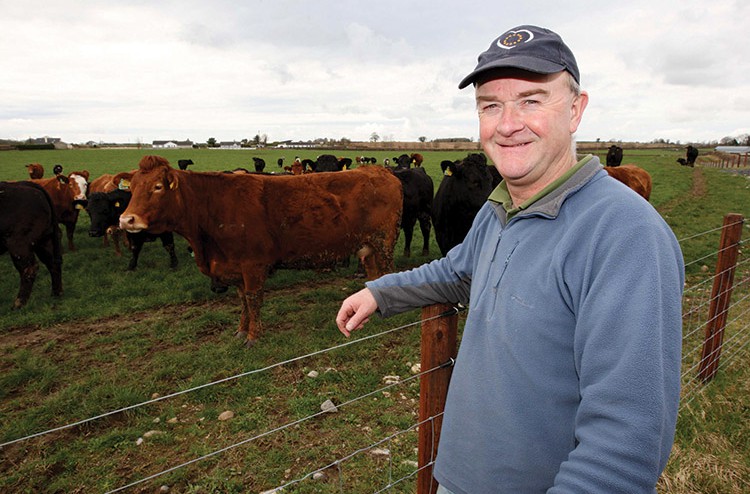
Robin Talbot is the fourth generation of his family to live and farm in Coole, Ballacolla, Co Laois. A commercial beef and suckler farmer, he produces quality cattle for the Irish and European markets.
Benjamin Talbot, Robin’s great grandfather, was the first Talbot to live in Coole, arriving around 1870, when he took on the rent of 160 acres from the Right Hon John Fitzpatrick, 1st Baron of Upper Ossory.
Fast forward 146 years and Robin is maintaining the family’s proud legacy. Steeped in traditional values, he farms in partnership with his mother Pam and wife Ann and they work long hours throughout the day to give their animals the best of care.
“I did my Inter Cert in 1972 and have worked full-time on the farm since 1973,” he recalled when speaking to Irish Tractor & Agri magazine. “My father (Bob) died when I was young and my mother Pam took over. She is still hale and hearty and takes and takes an active interest in the farm.
“Like a lot of young lads, at the time I thought I knew everything but I made lots of mistakes along the way. The key is not to make the same mistake twice!”
He continued: “We were typical of a lot of farms at that stage, into sheep, tillage, sugar beet, beef cattle. Traditionally, in my fathers and grandfathers time, they were buying cattle from the south and the west and bringing them home to finish.
“The turning point came when we went the suckler cow route.
“I myself spent a number of years going to marts buying mostly steers for finishing. Then hormones were made illegal. This took a while to filter through the system but we stopped using them immediately and it became obvious fairly quickly that this system was no longer sustainable financially. After considering our options, we decided to focus on sucking and built up from there.
“We’ve currently 220 autumn calving cows and the farm is 600 acres in size. We employ one man. Joe Hyland, who has been with us for the past nine years, while we use contractors for the silage and tillage work and spread manure and slurry ourselves.”
Robin is married to Ann (nee Fitzgerald) who has worked as an agricultural print journalist for almost twenty years, including seven years as Livestock Editor with the Farming Independent.
Since 2004, along with looking after the farm’s paperwork, she has primarily been a homemaker but has resumed some journalistic work since 2012. They have two daughters, Sarah and Ruth.
The Talbot farm uses Belgian Blue and Limousin stock bulls while the cows are Limousin cross. Their progeny are aimed at the high end of the quality market with the majority finished at under 20 months.
There is a big focus on maximising weight gain from grass and their cattle are 100% grass fed so they can guarantee the highest quality natural produce.
“We are always keeping an eye on what local processors are looking for and try to produce beef to spec.
“We take a lot of pride in the quality of the beef we produce. To that end, we get a lot of grass into our stock. There is very little concentrate brought on to the farm and we try to grow as much as we can. We tick a lot of the boxes when it comes to environmental, welfare and traceability issues.
“We’re currently in the process of researching what we need to do to produce carbon neutral beef. That’s a work in progress.”
Robin and the Talbot family also host regular farm visits; mainly by other farmers and agricultural students but also by others from the broader agri sector and will always try to facilitate anybody wishing to visit. In order for farming to survive, he believes it is critical that farmers help each other by sharing their experiences and information.
“We’ve had plenty of visitors, individuals and groups, to the farm,” he added. “The visits are something I enjoy. Farming can be a solitary occupation so it’s good to meet others here on our home turf and we have plenty of debates!”
Robin and Ann put their experiences down in writing in their 2013 published book ‘A Year on Our Farm’. A 120 page full colour A4 book, it chronicles events on their well-known farm.
The Talbots feel that farming and particularly beef farming rarely attracts positive consumer interest and they wanted to tell the story of what really happens on an Irish livestock farm on a day-to-day basis; to show a side to Irish agriculture that is positive, progressive and wholesome.
What advice would Robin give to any aspiring farmers thinking of going down the beef route?
“First of all, they have to have a love of farming, they have to make sure they love what they do because job satisfaction is vitally important. Basically, a system of farming is secondary, how well you do it is what counts and you have to have confidence in what you do.”
Robin concluded: “Beef is a good, safe and healthy food. The world population is growing as is the demand for red meat. Beef is one of our most important exports. If the political will is there to allow us, this sector can generate a lot of wealth inside our shores and feed an awful of people outside them.”
Robin Talbot
Beef Farmer,
Coole,
Ballacolla
Co. Laois
Mobile: 086 2693164
Email: [email protected]
Website: www.talbotsofcoolefarm.com
Taken from Irish Tractor & Agri magazine Vol 4 No 3, March 2016